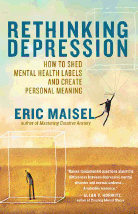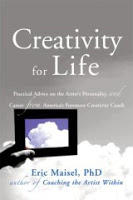If you’re a creative person and you’re not familiar with Eric Maisel’s body of work you’re missing out. Maisel’s books include: Affirmations for Artists, Coaching the Artist Within, Deep Writing, Living the Writer’s Life, The Van Gogh Blues, Write Mind and many more.
As Maisel writes in Creativity for Life, “Craft is doing. You learn to write by writing, you learn to paint by painting. The creative life comes with a lifelong apprenticeship that begins with “first paintings” and “first drawings” and continues throughout an artist’s career, as each new piece poses its questions and makes its demands. You learn your craft by doing: there is no substitute for getting to the work.”
Depression is dedicated to helping readers create.”
Two of my favorite quotes in Rethinking Depression.
Choice
“Since there is no path to follow but only paths for me to create,I know that I will be confronted by one choice after another and the anxiety that accompanies choosing.”
Following is a short article that introduces Rethinking Depression followed by a Q and A.
Rethinking Depression
By Eric Maisel
 There is something profoundly wrong with the way that we currently name and treat certain human phenomena. When we call something a “mental disease” or a “mental disorder” we imply a great deal about its origins, its treatment, its intractability, and its locus of control. The mental health industry has its reasons for calling life’s challenges “disorders” but we have few good reasons to collude with them.
There is something profoundly wrong with the way that we currently name and treat certain human phenomena. When we call something a “mental disease” or a “mental disorder” we imply a great deal about its origins, its treatment, its intractability, and its locus of control. The mental health industry has its reasons for calling life’s challenges “disorders” but we have few good reasons to collude with them.
In fact, the word depression has virtually replaced unhappiness in our internal vocabularies. We feel sad but we call ourselves depressed. Having unconsciously made this linguistic switch, when we look for help we naturally turn to a “depression expert.” We look to a pill, a therapist, a social worker, or a pastoral counselor — even if we’re sad because we’re having trouble paying the bills, because our career is not taking off, or because our relationship is on the skids. That is, even if our sadness is rooted in our circumstances, social forces cause us to name that sadness “depression” and to look for “help with our depression.” People have been trained to call their sadness “depression” by the many forces acting upon them, from the mental health industry to mass culture to advertising.
Chemicals have effects and they can alter a human being’s experience of life. That a chemical called an antidepressant can change your mood in no way constitutes proof that you have a mental disorder called depression. All that it proves is that chemicals can have an effect on mood. There is a fundamental difference between taking a drug because it is the appropriate treatment for a medical illness and taking a drug because it can have an effect. This core distinction is regularly obscured in the world of treating depression.
Psychotherapy, too, can help remediate sadness for the simple reason that talking about your problems can help reduce your experience of distress. Psychotherapy works, when it works, because the right kind of talk can help reduce a person’s experience of unhappiness. To put it simply, chemicals have effects and you may want those effects; talk can help and you may want that help. Antidepressants and psychotherapy can help not because they are the “treatment for the mental disorder of depression” but because chemical have effects and talk can help.
By taking the common human experience of unhappiness out of the shadows and acknowledging its existence, we begin to reduce its power. At first it is nothing but painful to say, “I am profoundly unhappy.” The words cut to the quick. They seem to come with a life sentence and allow no room for anything sweet or hopeful. But the gloom can lift. It may lift of its own accord — or it may lift because you have a strong existential program in place whereby you pay more attention to your intentions than to your mood.
What is an existential program? It is people taking as much control as possible of their thoughts, their attitudes, their moods, their behaviors, and their very orientation toward life and turning their innate freedom into a virtue and a blessing. Even if people decide to take antidepressants or engage in psychotherapy to get help with their unhappiness, they will still have to find ways of dealing with their meaning needs, the shadows of their personality, their consciousness of mortality, and the facts of existence.
Living authentically means organizing your life around your answers to three fundamental questions. The first is, “What matters to you?” The second is, “Are your thoughts aligned with what matters to you?” The third is, “Are your behaviors aligned with what matters to you?” You accept and embrace the fact that you are the final arbiter of your life’s meaning. With this approach to life, each day is a project requiring existential engineering skills as you bridge your way from one meaningful experience to the next. By accepting the realities of life and by asserting that you are the sole arbiter of the meaning in your life, you provide yourself sure footing as you actively make meaning.
If we can begin to move from the “depression is a mental disorder” model to the idea that human beings must deal more effectively with the realities of human existence, including the realities of sadness, despair, and grief, we will have taken a giant step away from “medicalizing everything” and toward lives lived with renewed passion, power and purpose.
Eric Maisel, PhD, is a licensed psychotherapist and the author of Rethinking Depression and numerous other titles including Mastering Creative Anxiety, Brainstorm, Coaching the Artist Within, and A Writer’s San Francisco. He blogs for Psychology Today and the Huffington Post and writes for Professional Artist Magazine. Visit him online at http://www.ericmaisel.com.
Based on the book Rethinking Depression ©2012 by Eric Maisel. Printed with permission of New World Library, Novato, CA. www.newworldlibrary.com
Q & A
How does following your Existential Program make it possible for people to take control of their lives?
Living authentically means organizing your life around your answers to three fundamental questions. The first is, “What matters to you?” The second is, “Are your thoughts aligned with what matters to you?” The third is, “Are your behaviors aligned with what matters to you?” You begin by removing the protective blinders that human beings put in place to avoid noticing the many painful facts of existence, including painful facts about their personality shortfalls. You decide to understand “what meaning means” to you so that you can proceed to lead your life in ways that feel personally meaningful. You choose to take responsibility for your thoughts and your actions and to lead life instrumentally. You accept and embrace the fact that you are the final arbiter of your life’s meaning. With this approach to life, each day is a project requiring existential engineering skills as you bridge your way from one meaningful experience to the next. By accepting the realities of life and by asserting that you are the sole arbiter of the meaning in your life, you provide yourself sure footing as you actively make meaning.
So much of what you propose is dependent on people accepting responsibility for their own life’s meaning. How does one arrive at such a definition?
Nothing is more important than meaning, and nothing is so little investigated. I encourage people to understand and embrace the fact that meaning — what we value, how we construe our life purposes, what we make of the facts of existence — is a completely subjective affair. Not only is meaning subjective; meanings are bound to shift and change. Once we accept this view, meaning is always available to us. It is waiting for us. All we need to do is think and act in ways that tease it out of its latency. What we are teasing out is a certain psychological experience. Things do not have meaning; human beings experience meaning. Some activities, such as service, ethical action, and self-actualization, and some states of being, such as contentment, appreciation, and intimacy, are regularly experienced as meaningful. A list of these meaning opportunities make for an excellent “meaning menu” to peruse as we decide where we want invest our human capital. But they are not intrinsically meaningful. They are only meaningful when they are experienced as meaningful.
How do you suggest people go about creating a life-purpose vision?
You might start by creating a life-purpose sentence or statement. In one great gulp you take into account the values you want to uphold, the dreams and goals you have for yourself, and the vision you have for comporting yourself in the world, and then you spend whatever time it takes turning that unwieldy, contradictory material into a coherent statement that reflects your core sentiments about your life. Your life-purpose vision is the inner template by which you measure life, and it remains that measure until you revise it. When you agree to commit to making meaning you agree to participate in a lifetime adventure. As you live you gain new information about what you intend to value and what you want your life to mean.
Lovingly,
The Writing Nag



I agree with you, completely. As an artist and writer, Eric Maisel's books have been a welcome guide along my creative path.
I'm especially grateful he was brave enough to take on the 'depression and anti-depressant' problem, explaining it in such a clear way.